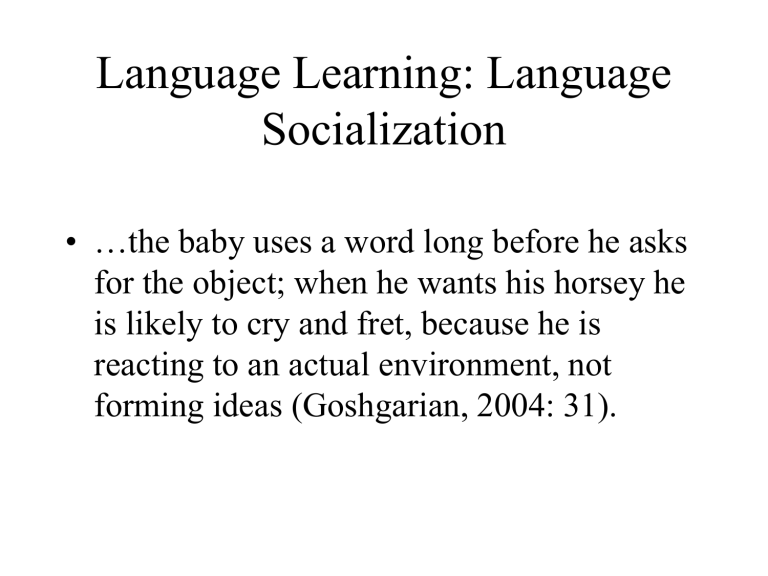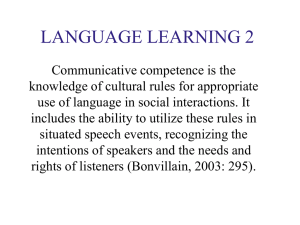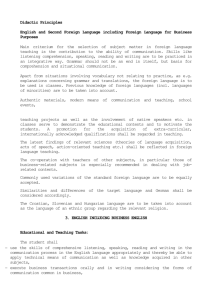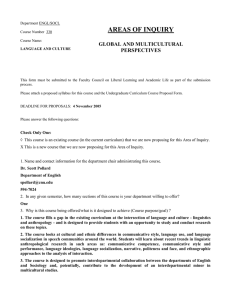Language Learning: Language Socialization

Language Learning: Language
Socialization
• …the baby uses a word long before he asks for the object; when he wants his horsey he is likely to cry and fret, because he is reacting to an actual environment, not forming ideas (Goshgarian, 2004: 31).
In what ways are the relationship between language and gender cross-culturally similar or different to the relationship between language and race?
Previously:
• Social roles and language use :
--class, caste, gender, race, etc.
• Language and social meanings:
--reflects social and cultural norms
• Linguistic markers:
--sounds, grammar, morphology
Communicative Competence
Knowledge of rules of language and language use. Communicative competence entails ability to speak a particular language and knowledge of cultural and social norms of appropriate language use in given interactional contexts.
Today’s Basic Questions
• 1. How is this communicative competence acquired?
• 2. How are children socialised into appropriate linguistic behaviour?
• 3. How linguistic practices are made to seem natural?
Linguistic Ability
• Symbolic representation
• Awareness of symbolism of sounds
• Relational situations : people, objects, and/or activities
• Discovery and creativity
• Universality of process (acquisition of language)
Acquisition of language: Steps
• 1. Learning to differentiate and produce sounds
• 2. The beginning of grammatical construction
• 3. Morphological development:
• 4. Growth in vocabulary
• 5. Syntactic development
Syntactic development
• Expansion of grammar: new propositions
• Example: negation
• Simple:N + Sentence or Sent + N = No sit there.
• More sophisticated: He not little, he big.
• Complex incorporation: I didn’t did it
Child-Rearing Practices and
Language Instruction: Three
Cases
• Ochs (1988) and Schieffelin (1990)
• White-middle- class (USA ): infants encouraged to speak
• Samoa
( A group of six Polynesian islands in the South Pacific): opposite
• Kaluli (New Guinea): opposite
• Different practices and values = diff linguistic socialization
White-Middle-Class (USA):
Language Instruction
• Infants treated as persons
• Potential and actual conversational partners
• Interpretation of infant’s vocalization and gestures as meaningful
• Establishes communicative structures
• Simplification of language(caregiver) baby talk
Samoan: Language Instruction
• Infant’s mobility (Crawling) determines hiss/her status as a conversational partner
• Infant’s vocalization and gestures not
“speech act”
• Stratification by age and title
• Lower-rank status: infant
Samoa
Child appeals to high-ranking caregiver
(A B)
High-ranking caregiver directs lowerranking caregiver (B C)
Lower-ranking caregiver responds to child (C A)
Turn taking sequencing in the USA (ABBA)
Samoan Communicative
Interaction:
• Multiparty sequencing: along hierarchical lines
• Social hierarchy and meaning: clarification of meaning (lower rank)
• Cultural priorities through language instruction (paying attention to social hierarchy)
Kaluli: Language Instruction
• Egalitarian
• Emphasis on network of obligation and reciprocity
• Language means to ge rights and desires
• Infants: helpless, lacking understanding
• Not considered conversational partners
Socialization and language
Acquisition
• Teaching how to become assertive
• Teaching by example
• Social rules transmitted through language instruction
Summary
• Discovery and creativity universal: steps
• Cultural practices to make a child language competent differ cross culturally
• Ochs (1988) and Schieffelin (1990)
• Different cultural practices reflects on linguistic socialization
Discussion Question
How do child rearing linguistic practices play a central role in making the child into a competent member of a culture? Provide examples from your own culture.





